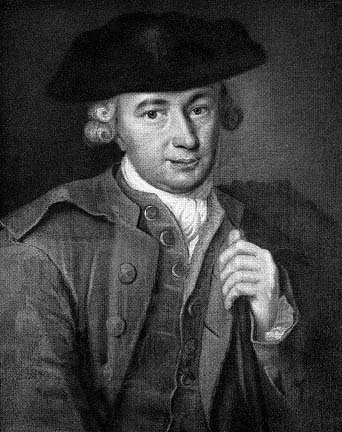Johann Georg Hamann frasi celebri
Capitolo nono, Lo Sturm und Drang e Herder, p. 239
Citato in René Wellek, Storia della critica moderna, I. Dall'Illuminismo al Romanticismo.
Johann Georg Hamann Frasi e Citazioni
Capitolo nono, Lo Sturm und Drang e Herder, p. 240
Citato in René Wellek, Storia della critica moderna, I. Dall'Illuminismo al Romanticismo.
“[…] la Natura e la Sacra Scrittura sono i materiali dello spirito bello che crea e imita.”
Capitolo nono, Lo Sturm und Drang e Herder, p. 239
Citato in René Wellek, Storia della critica moderna, I. Dall'Illuminismo al Romanticismo.
Capitolo nono, Lo Sturm und Drang e Herder, p. 239
Citato in René Wellek, Storia della critica moderna, I. Dall'Illuminismo al Romanticismo.
“[…] genere naturale di profezia.”
Capitolo nono, Lo Sturm und Drang e Herder, p. 239
Citato in René Wellek, Storia della critica moderna, I. Dall'Illuminismo al Romanticismo.
“Nessun gioco di prestigio estetico può rimpiazzare il sentimento immediato.”
Capitolo nono, Lo Sturm und Drang e Herder, p. 241
Citato in René Wellek, Storia della critica moderna, I. Dall'Illuminismo al Romanticismo.
“Il genio sonda tutte le cose, anche le cose più profonde di Dio.”
Capitolo nono, Lo Sturm und Drang e Herder, p. 240
Citato in René Wellek, Storia della critica moderna, I. Dall'Illuminismo al Romanticismo.
Johann Georg Hamann: Frasi in inglese
Socratic Memorabilia, J. Flaherty, trans. (Baltimore: 1967), p. 147.
Sämtliche Werken, ed. Josef Nadler (1949-1957), vol. III, p. 231.
Briefwechsel, ed. Arthur Henkel (Wiesbaden/Frankfurt: Insel Verlag, 1955-1975), vol. V, p. 177.
Therefore these words were a thorn in their eyes and a scourge on their backs.
Socratic Memorabilia, J. Flaherty, trans. (Baltimore: 1967), pp. 165-167.
Sämtliche Werken, ed. Josef Nadler (1949-1957), vol. III, p. 40.
Sämtliche Werken, ed. Josef Nadler (1949-1957), vol. III, p. 286.
“Poetry is the mother-tongue of the human race.”
Sämtliche Werken, ed. Josef Nadler (Vienna: Verlag Herder, 1949-1957), vol. II, p. 197.
“Through a vicious circle of pure reason skepsis itself becomes dogma.”
Briefwechsel, ed. Arthur Henkel (1955-1975), vol. V, p. 432.
Briefwechsel, ed. Arthur Henkel (1955-1975), vol. VI, p. 281.
Sämtliche Werken, ed. Josef Nadler (1949-1957), vol. III, p. 32.
Briefwechsel, ed. Arthur Henkel (1955-1975), vol. VII, p. 165.
Briefwechsel, ed. Arthur Henkel (1955-1975), vol. VI, p. 22.
